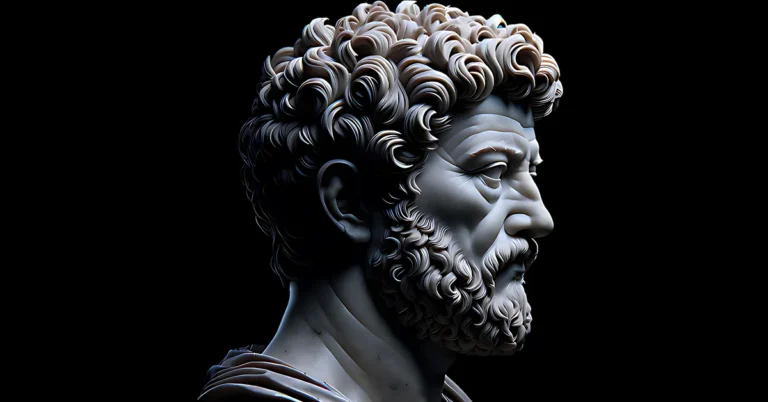Stoic Philosophy Meaning
I guess you expect a straightforward explanation of Stoicism philosophy. But, please stay with me as I choose to go slow.
Seneca said, “You act like mortals in all that you fear, and like immortals in all that you desire.”
Most people don’t lack time—they lack direction. The day is filled with distractions, wasted effort, and unnecessary stress. Stoicism isn’t about having more hours; it’s about using them wisely.
The Stoics mastered the art of living with intention—eliminating distractions, focusing on what matters, and taking control of their actions. If you’ve ever felt like time is slipping away, it’s not because life is short. It’s because too much of it is lost on things that don’t serve you.
By adopting daily Stoic habits, you can reclaim your time, sharpen your focus, and free up hours for what truly matters. Let’s break down 8 powerful habits that will save you at least 3+ hours a day.

What Are the Stoic 4 Rules?
The four Stoic virtues are:
Wisdom – Making rational decisions based on knowledge.
Courage – Facing challenges with bravery.
Justice – Treating others with fairness and integrity.
Temperance – Practicing self-discipline and balance.
These virtues guide Stoic habits and help in leading a meaningful life.

What Are Stoic Habits?
Stoic habits are daily practices rooted in Stoic philosophy that emphasize discipline, mindfulness, and purposeful action. The goal is to minimize distractions, focus on what truly matters, and maximize efficiency. These habits help in making smarter decisions, cutting down on wasted time, and leading a more balanced life.
1. Prioritize What Truly Matters
The Stoic philosopher Epictetus‘s concept of the dichotomy of control: focus on what you can control and let go of what you can’t. Your actions and reactions are within your control, but external factors like other people’s opinions are not.
Marcus Aurelius, the Roman Emperor and Stoic philosopher, applied this principle daily. Despite ruling an empire filled with challenges, he stayed committed to his duties and Stoic practices.
How to Apply It:
Identify your top priorities (career, family, personal growth, etc.).
Cut out distractions and unnecessary tasks.
Say no to things that don’t align with your goals.
2. Practice Morning Mindfulness
One of the most powerful Stoic habits is starting the day with reflection. Marcus Aurelius emphasized the importance of morning mindfulness in his book Meditations.
Instead of diving into your daily grind, spend a few minutes journaling, meditating, or simply thinking about your goals for the day. This practice helps maintain a Stoic mindset, keeping you calm and focused.
Morning Habits of a Stoic:
Spend 5 minutes journaling about your main goals.
Plan how to handle challenges with a Stoic attitude.
Set an intention to focus only on what’s in your control.
3. Simplify Your Decisions
Decision fatigue is real. The more trivial choices you make, the less mental energy you have for what truly matters. Stoicism teaches the importance of keeping things simple.
Epictetus believed in eliminating unnecessary distractions and focusing on what’s essential. Even modern leaders, like Steve Jobs, followed this concept by wearing the same outfit daily to avoid wasting time on trivial choices.
How to Apply It:
Plan outfits and meals in advance.
Automate small decisions with routines.
Stick to a structured schedule to avoid decision overload.
4. Limit Social Media and Distractions
Seneca warned about time-wasting distractions. Today, social media is a major culprit. Endless scrolling can steal hours from your day without adding any value.
How to Be a Stoic in the Digital Age:
Set specific times to check social media.
Turn off unnecessary notifications.
Ask yourself, “Is this adding value to my life?” before engaging online.
5. Embrace Efficiency in Daily Tasks
Stoics valued purposeful action. They believed in making every moment count. This means optimizing daily routines to save time and energy.
How to Implement It:
Meal prep to save cooking time.
Listen to audiobooks during commutes.
Set up automatic bill payments.
6. Delegate and Let Go
Trying to control everything leads to stress and inefficiency. Stoic philosophy teaches humility—accept that you can’t do it all.
Practical Tips:
Identify tasks you can delegate.
Trust others to handle responsibilities.
Focus on what truly needs your attention.
7. Value Your Time Like Money
Seneca compared time to money: just as you wouldn’t waste cash, don’t waste time. If you had to pay for every minute of your day, would you still waste hours on distractions?
How to Apply It:
Track your daily activities to spot wasted time.
Cut out habits that don’t align with your goals.
Treat every hour as an investment in your future.
8. Reflect and Adjust
Marcus Aurelius spent time every night reflecting on his actions, analyzing what went well and what didn’t. Self-reflection is key to making continuous improvements.
How to Practice It:
Set aside time each week to review your progress.
Identify habits that are wasting your time.
Make small adjustments to stay on track.

Anti Stoic Habits
Just as there are powerful Stoic habits, there are also behaviors that go against Stoic principles. Avoiding these anti Stoic habits can help you live a more productive and fulfilling life.
Common Anti Stoic Habits
Overreacting to things you can’t control.
Wasting time on distractions like gossip and negativity.
Chasing external validation instead of focusing on self-improvement.
What Is the Lifestyle of a Stoic?
The Stoic lifestyle is about simplicity, discipline, and mindful living. It’s about valuing time, minimizing distractions, and staying focused on what matters most.
How to Be a Stoic
If you want to fully embrace a Stoic mindset and make every moment count, start implementing these 8 Stoic habits today.
Key Takeaways:
Prioritize what truly matters.
Start your mornings with mindfulness.
Simplify your decisions to avoid fatigue.
Limit distractions and social media.
Make daily tasks more efficient.
Delegate and let go of unnecessary burdens.
Value your time like money.
Reflect regularly and adjust your actions.
By adopting these Stoic principles, you’ll not only save hours each day but also live with greater purpose, clarity, and peace of mind.
Are you ready to transform your daily routine with 8 Stoic habits to practice in 2025? Start small, stay consistent, and embrace the wisdom of the Stoics.


